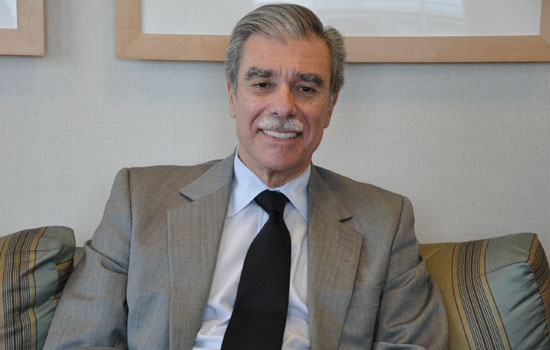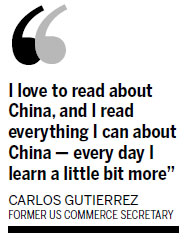 |
|
Former US commerce secretary Carlos Gutierrez says he believes China and the US are too interdependent to risk a trade war. [Photo/China Daily] |

On a mid-September afternoon - having returned from North Carolina where he joined Republican presidential candidate Mitt Romney's son for a meeting with Latino business owners - Carlos Gutierrez sits in his office in Citigroup Inc's downtown Manhattan building, busy with another media interview.
In this go-round on national television, the man who ran the Commerce Department during George W. Bush's second term isn't asked - as an ex-Cabinet secretary often is - about the US presidential race or politics per se. Today's topic is China, a country whose culture and people, Gutierrez says, "never cease to impress".
Wearing a light-gray suit, white shirt and black tie, Gutierrez looks relaxed, in contrast to a few weeks earlier when he was scurrying about the Republican National Convention in Tampa. As the trade adviser to Romney's campaign, Gutierrez spoke at the party gathering on Florida's Gulf of Mexico coast on a series of panels. The topics were tied to the US economy, the federal government's massive debt and immigration policy.
The former commerce chief is concerned about current economic conditions in the country. The government, he says, is relying too much on printing money - formally called "quantitative easing", whereby the Treasury Department buys its own bonds off the market - and its large stimulus package, "which didn't work very well" in Gutierrez's estimation.
At an estimated $16 trillion, the US sovereign debt this year surpassed the size of the country's economy. Continued big spending by Washington, the former Bush aide stresses, has created this problem, and he's worried.
"I was giving interviews 'til 11:30 at night sometimes" during the convention, he says.
It was only natural to quickly add a follow-up question about the RNC: Could Romney's China-bashing comments during the campaign, including his promise to brand Beijing a "currency manipulator" on his first day as president if he's elected, harm relations between the two countries.
"I think eventually there is going to have to be a face-to-face dialogue," Gutierrez answers. "The most important thing is to recognize that there are issues and problems."
Numbers provide an explanation. China has been the United States' fastest-growing export market for 11 consecutive years, though it remains in third place as the biggest US trade partner, just behind Canada and Mexico. China-US trade was worth $446.7 billion last year, according to China's Ministry of Commerce. Chinese imports of US goods and services amounted to $122.2 billion in 2011, surpassing $100 billion for the first time.
The former secretary says that while over the short term the two countries will have issues to resolve, the longer term will always confirm that China and the US have common interests.
"That's what brought us together and that will keep us together," he adds.
No trade war in sight
The Cuban-born Gutierrez, 58, who is now vice-chairman of the Institutional Clients Group at Citigroup, was chosen by Bush as the nation's 35th commerce secretary, a post he served in from 2005 to 2009.
He says the world's two economic leaders are too interdependent to risk a trade war.
But Gutierrez suggests that more dialogue between Washington and Beijing would help increase "transparency".
That view is based on his understanding of the bilateral trade relationship while the top man at Commerce, and experience as a businessman dealing with China.
As secretary, Gutierrez frequently visited Latin America and was a supporter of the US-Colombia Free Trade Agreement. He played a key role in the passage of CAFTA-DR, a landmark trade pact that expanded opportunities for US exports throughout Central America and the Dominican Republic.
But, on China, he admits, he put in "more time than, probably, any other issue".
During those four years as commerce chief, Gutierrez visited China at least twice a year to attend events such as the Strategic Economic Dialogue, a framework for bilateral economic talks, as well as other bilateral trade discussions.
"I've got some great stories to share," he says, indicating something exclusive is forthcoming. "When China started exporting textiles, we had an agreement that if the exports were so high that it disrupted the market, we could put in a quota for a certain amount of time, and so we did that (in 2005)," he explains.
Gutierrez felt that the decision needed some face-to-face explanation to the people involved, who in this case were Chinese factory workers. So he visited a textile factory in China and spoke to its employees.
"But I enjoyed it, because I think that part of the relationship is, if we make a decision, we should explain why, and if it's necessary, to go to the plant to tell the workers ... I felt that I had certain - if not a responsibility, that it was just the right thing to do."
Those China trips and reciprocal ones from top Chinese officials during his time on Bush's team helped Gutierrez understand the country where he had developed good relationships and had candid discussions on various issues.
"We had developed the trust level so we could talk to each other," he says.
On a personal level, the ex-secretary says he's very impressed by the Chinese people, as well as "their ability to go through a difficult time, and to be strong enough to survive and to prosper", he explains.
He shares his own sense of the country: "You know, life hasn't been easy for the last 5,000 years, but the Chinese people are strong and they've been able to grow and strive during very difficult times."
By the time he left the Commerce Department in 2009, Gutierrez had already formed a strong interest in China and became a devoted reader of Chinese literature.
"I love to read about China, and I read everything I can about China - every day I learn a little bit more," he says.
"The art, the people, the culture, and the history - just the whole experience - I am fascinated by China. I can't read enough; I have read a lot about the 20th century and now I am reading The Red Chamber," he says as he looks away to the window into a foggy scene of Manhattan, thinking.
Fall and recovery
The Red Chamber, by Pauline Chen, perhaps wasn't an entirely random choice for Gutierrez. The book is a retelling of The Dream of the Red Chamber, the classic 18th-century Chinese novel by Cao Xueqin about the rise and fall of a wealthy family in a fictional ancient dynasty.
The novel draws some parallels to Gutierrez's own family story, which began in Havana. He was born into a wealthy family in the Cuban capital. His father was the owner of a pineapple plantation, providing the family with a comfortable life until 1959 when Fidel Castro took power in Cuba's communist revolution and began seizing private businesses such as that of Gutierrez's father.
The family soon fled for Miami, as did so many Cuban exiles then and for decades to come. The 6-year-old Gutierrez came to the US as a refugee, he recalls.
Soon after that, the young Gutierrez embarked on a nomadic life, first moving with his family on his father's jobs in the US and then Mexico, and later on his own career starting from a young sales trainee at the multinational food-processing giant Kellogg Co in Mexico.
The pain of loss inspired Gutierrez to work hard, which probably explains his grasp of the Chinese people's ability to endure hard times and emerge stronger. To an extent, that resonates with his own life experience.
During his nearly 30 years at Kellogg, Gutierrez worked his way up - from sales trainee who drove a truck to deliver Zucaritas (Frosted Flakes) in Mexico City - to the executive suite and the company's top job.
In 1999, at age 45, Gutierrez became the youngest CEO in Kellogg's nearly 100-year history.
Today, after making his name as one of the most successful leaders in the business world, the former official is humble, gentle and polite. "When you are with him, you get a feeling of his strength - but it's very quiet strength," a former Kellogg colleague told the Detroit News.
Amid limited media coverage of Gutierrez himself, in 2004 just months before he moved on to the Commerce post, Fortune magazine published a story headlined "The Man Who Fixed Kellogg", praising Gutierrez's ability to manage turnarounds and make Kellogg an innovative, profit-driven company.
Mission continues
Now back to the private sector with Citigroup, he visits China more than ever-four or five times a year, he says.
On his visits, the vice-chairman meets with Chinese CEOs from State-owned enterprises and private companies and gives them all kinds of advice about their investments in the US, from corporate banking services to mergers and acquisitions.
In his capacity with Citigroup, Gutierrez enjoys meeting "sophisticated and impressive" Chinese CEOs whom he regards as "one of China's great strengths".
"Their knowledge of strategy - what they want to do and what they don't - and knowledge of technology, and the way they have managed their business, is all remarkable."
For Gutierrez, the mission to learn about and comprehend China continues.
"I never cease to be impressed by what I see in China," he says.
Updated: 2012-10-12 09:55
By Zhang Yuwei ( China Daily)